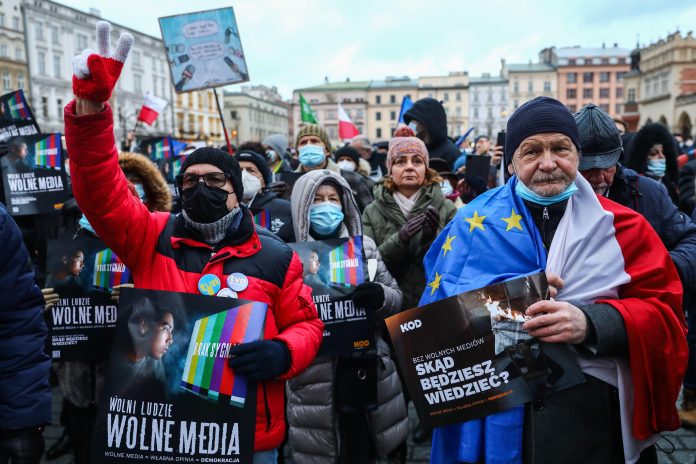Politicians pose the main threat to media freedom in Europe, with a third of EU member states categorised as “problematic.” Even “good” and “satisfactory” countries have seen their scores decline, according to the Reporters Without Borders (RSF) World Press Freedom Index 2024, published on Friday.
The report, which focuses on media freedom and journalists’ rights around the world, found that in Europe, “politicians are trying to reduce the space for independent journalism.”
Greece ranked worst in the EU for the third consecutive year due to several factors, including the unsolved murders of two journalists Sokratis Giolias and Giorgos Karaivaz, as well as spyware scandals and political targeting of critical media outlets.
Italy, ruled by Prime Minister Giorgia Meloni, also performed poorly, dropping five positions to the 46th place. This was due to an attempt by “a member of the ruling parliamentary coalition” to acquire the second largest news agency (AGI).
The report also singled out France and the UK, calling for “vigilance” over the arrest of French journalist Ariana Lavrilleux by French authorities and the continued detention of Julian Assange by British authorities.
With EU elections just weeks away and half of the world’s population taking part in local or national elections this year, RSF warns of a decline in the political indicator in the index, according to Anne Bocande, RSF’s editorial director.
“States and other political forces are playing a decreasing role in protecting press freedom. This disempowerment sometimes goes hand in hand with more hostile actions that undermine the role of journalists or even instrumentalise the media through campaigns of harassment or disinformation.”
This year’s report also addressed technology, highlighting the risks that generative artificial intelligence (AI) and deepfakes could pose to democracy and elections.
This was evidenced by the audio deepfake of the journalist Monika Todova during the parliamentary elections in Slovakia (down 12 at 29th), one of the first documented cases of this kind of attack on a journalist to influence the outcome of a democratic election.
Several countries recorded improvements, including Poland, up ten places to the 47th position, and Bulgaria, up 12 places to the 59th. The report stated that this was “thanks to new governments with greater concern for the right to information.” Germany was also among the top 10 countries, improving its political performance as it reported a decline in attacks on media workers by violent groups.
As for the EU accession contenders, Albania dropped to the 99th place, mainly due to the murder of a television station security guard Pal Kola in March 2023, which was still unsolved. The index was also affected by the conflict of interest of media owners, political pressure, insufficient legal framework and self-censorship.
In the other Western Balkan countries, North Macedonia climbed two places to 36, Montenegro dropped one, Kosovo dropped 19, Bosnia and Herzegovina dropped 17 and Serbia dropped seven.
“In Serbia, the ruling party and the pro-government outlets have stepped up the attacks on independent journalism. In the context of the tensions with Serbia, journalists in Kosovo have suffered numerous physical assaults.”
Georgia dropped 25 places to the 103rd position as “its ruling party continues to polarise society,” while Ukraine moved up 18 places due to fewer murders of journalists and less political interference in the press.
